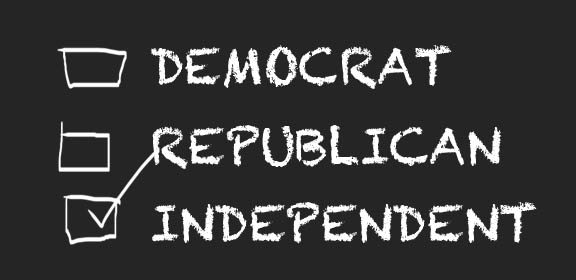CA Independent Voters Big Winners in Tuesday’s Primary Election

Even before the first vote is counted, Tuesday’s Statewide Primary Election had a big winner: California’s independent voters. For the first time in over a decade, the votes of the state’s 3.6 million independent voters (now called “No Party Preference”) actually mattered in State Legislative and Congressional elections. The political impact on the state’s elections has been dramatic.
Independent voters are not unified by an ideological agenda. Polling done by the Public Policy Institute of California continues to show that about 40% of independents describe themselves as moderates, 30% as liberals, and 30% as conservatives. Independent voters are unified around their views on broken government – 89% of independents trust the government to do what is right “only sometimes” or “never” according to a recent CNN Poll. Independents see the political process as being focused primarily on what is best for the political parties rather than what is best for the people.
Tuesday’s primary marks the debut of the Top Two Open Primary, which transformed California’s elections into non-partisan affairs much like our local elections. All the candidates run on the same ballot. All the voters cast their vote for the candidate of their choice – regardless of party. The top two vote getters will then go on to a runoff style election in November. It also marks the debut of districts drawn by an independent citizens commission (which included independent voters) rather than a gerrymandered map prepared by politicians in the State Legislature. Independent voters and IndependentVoice.Org overwhelmingly supported the passage of these reforms at the ballot in 2008 and 2010. Taken together, these reforms have blown open a political system that was once very hostile to the state’s independent voters.
The reaction of California’s political players was the first major impact of these changes. Deprived of a guaranteed re-election based on controlled party primaries and gerrymandered districts, a number of incumbent politicians decided to retire rather than compete in an open process. It was exactly that open process that attracted many candidates who could not have won a partisan primary – including for the first time independent candidates without a party affiliation. Having a new field of candidates and 3.6 million independent voters involved in the process stimulated new kinds of dialogue. No longer focused on who was the most loyal Republican or Democrat, primary debates became a place to actually talk about a broad range of issues with a large array of viewpoints.
The second major impact was the emergence of an organized “third force” of independents in California’s State Legislative and Congressional elections. My organization, IndependentVoice.Org, went through an endorsement process aimed at educating candidates about the concerns independent voters have about partisanship and their desire to reform the political process. Through that process we endorsed three Congressional Candidates who embraced that independent reform agenda: Republican Abel Maldonado, Democrat Stacey Lawson, and independent Linda Parks.
The Independent Voter Network, led by former legislator Steve Peace and one of our partners in passing the Top Two Open Primary, sent out 500,000 mailers to independent voters informing them of their right to participate in Tuesday’s election and ran a virtual primary campaign. They also held a press conference highlighting independent candidates around the state – several of whom may actually “win” their election and get into the second round of voting. We even witnessed the launch of the first “Super PAC” for independent candidates – icPurple.Org, led by Gateway CEO Ted Waitt – specifically airing television commercials with a message about the necessity of non-partisan leadership. While each of these organizations has a different focus, this third force of independents pushed an agenda of challenging partisanship and promoting reforms that make the political process more democratic and inclusive.
There are still challenges ahead for California. Too many independents are still unaware that they can now participate in the primary. Many of the established political players are still resistant to speaking to independent voters on the issues that most concern them – partisanship and broken government. The organized independent forces are still small in number and under-resourced.
Whatever those challenges, California’s primary election has proven that when partisan control is removed and independent voters are included, new possibilities can emerge. Independent voters 1, Political Partisans 0.
------
Jason Olson is the Director of IndependentVoice.Org which represents California's 3.6 million independent voters and worked to successfully pass the Top Two Open Primary (Prop 14) and Redistricting Reform (Props 11 and 20).




